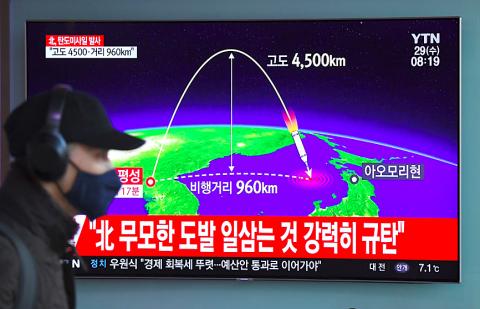North Korean leader Kim Jong-un claimed that a missile launch yesterday showed he could strike the entire US with a nuclear weapon, signaling a new phase in his standoff with US President Donald Trump.
North Korea “successfully” launched a new type of intercontinental ballistic missile (ICBM) with improved technology that can deliver a nuclear warhead anywhere in the US, the Korean Central News Agency (KCNA) said.
Kim watched the test and “declared with pride that now we have finally realized the great historic cause of completing the state nuclear force,” it said.

Photo: AFP
Kim’s claims on his nuclear capabilities, yet to be verified independently, suggest he is seeking to push the US into talks from a position of strength.
Trump has threatened to use military force to stop Pyongyang’s nuclear program, which Kim says he needs to deter a US invasion, and Washington has long said the regime must dismantle its weapons for negotiations to start.
Trump struck a more measured tone after the launch, compared with previous threats to unleash “fire and fury,” telling reporters “we will take care of that situation.”
The UN Security Council, which imposed sanctions on North Korea this year, planned to meet later yesterday in New York.
“North Korea is saying the US should acknowledge it as a nuclear state and shift its policy to dialogue,” said Koh Yu-hwan, who teaches North Korean studies at Dongguk University in Seoul. “Pyongyang’s following the Chinese model: obtain nuclear weapons and suggest co-existence to the US.”
No major power has said it will recognize North Korea as a nuclear state. China and Russia, two countries that Trump has singled out for supporting North Korea, have said they prefer dialogue to rein Kim in.
China opposed yesterday’s test and will continue to strictly uphold UN sanctions, Chinese Ministry of Foreign Affairs spokesman Geng Shuang (耿爽) said at a regular briefing.
He reiterated support for a proposal made with Russia, under which North Korea refrains from missile and nuclear tests, while the US and South Korea halt large-scale military exercises.
Japanese Prime Minister Shinzo Abe told parliament it would be a mistake to recognize North Korea as a nuclear power.
Experts differ on when North Korea will pose a credible threat to the US, with estimates ranging from months to years. While the regime has made steady progress, the US and South Korea assess that its ballistic missiles still cannot survive the stress involved with re-entering the atmosphere or target specific locations.
Japanese Minister of Defense Itsunori Onodera said that Tokyo was analyzing whether North Korea had that capability.
Japan said the ICBM flew for 53 minutes on a lofted trajectory and might have reached an altitude of more than 4,000km before landing about 250km off its northwest coast.
US Secretary of Defense James Mattis said it flew higher than prior North Korean launches.
KCNA said the missile it fired showed accuracy in its target, speed correction mid-flight and the operation of a high-thrust engine.
“The test-fire also reconfirmed the control and stabilization technology, phase-separation and start-up technology, and the safety of warhead in the atmospheric reentry environment that had already been confirmed,” it said.

The CIA has a message for Chinese government officials worried about their place in Chinese President Xi Jinping’s (習近平) government: Come work with us. The agency released two Mandarin-language videos on social media on Thursday inviting disgruntled officials to contact the CIA. The recruitment videos posted on YouTube and X racked up more than 5 million views combined in their first day. The outreach comes as CIA Director John Ratcliffe has vowed to boost the agency’s use of intelligence from human sources and its focus on China, which has recently targeted US officials with its own espionage operations. The videos are “aimed at

STEADFAST FRIEND: The bills encourage increased Taiwan-US engagement and address China’s distortion of UN Resolution 2758 to isolate Taiwan internationally The Presidential Office yesterday thanked the US House of Representatives for unanimously passing two Taiwan-related bills highlighting its solid support for Taiwan’s democracy and global participation, and for deepening bilateral relations. One of the bills, the Taiwan Assurance Implementation Act, requires the US Department of State to periodically review its guidelines for engagement with Taiwan, and report to the US Congress on the guidelines and plans to lift self-imposed limitations on US-Taiwan engagement. The other bill is the Taiwan International Solidarity Act, which clarifies that UN Resolution 2758 does not address the issue of the representation of Taiwan or its people in

US Indo-Pacific Commander Admiral Samuel Paparo on Friday expressed concern over the rate at which China is diversifying its military exercises, the Financial Times (FT) reported on Saturday. “The rates of change on the depth and breadth of their exercises is the one non-linear effect that I’ve seen in the last year that wakes me up at night or keeps me up at night,” Paparo was quoted by FT as saying while attending the annual Sedona Forum at the McCain Institute in Arizona. Paparo also expressed concern over the speed with which China was expanding its military. While the US

SHIFT: Taiwan’s better-than-expected first-quarter GDP and signs of weakness in the US have driven global capital back to emerging markets, the central bank head said The central bank yesterday blamed market speculation for the steep rise in the local currency, and urged exporters and financial institutions to stay calm and stop panic sell-offs to avoid hurting their own profitability. The nation’s top monetary policymaker said that it would step in, if necessary, to maintain order and stability in the foreign exchange market. The remarks came as the NT dollar yesterday closed up NT$0.919 to NT$30.145 against the US dollar in Taipei trading, after rising as high as NT$29.59 in intraday trading. The local currency has surged 5.85 percent against the greenback over the past two sessions, central